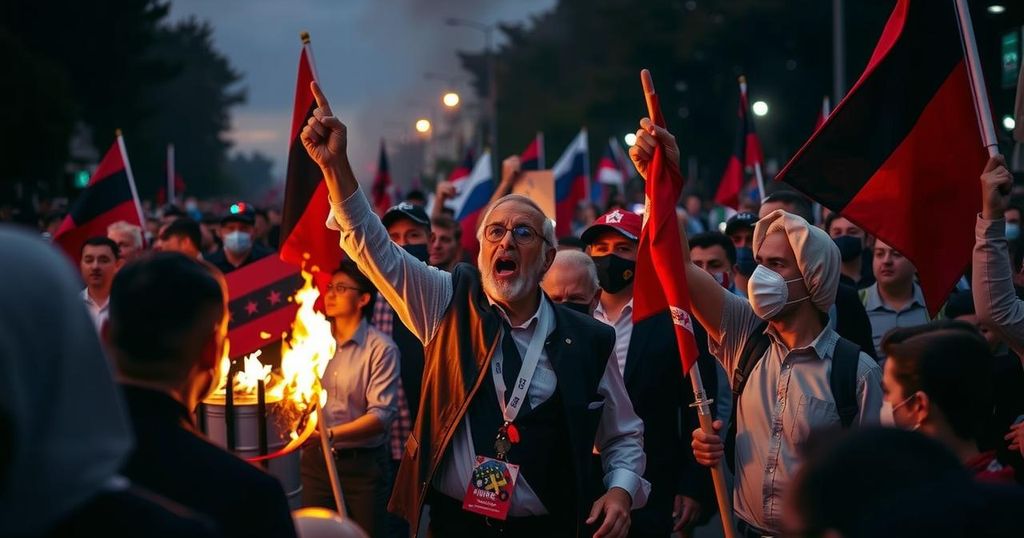Georgian Dream Declares Victory in Parliamentary Elections Amid Protests
The Georgian Dream party has won the parliamentary elections in Georgia, securing over 54% of the vote amidst opposition protests denouncing the election as fraudulent. Though they have achieved a parliamentary majority, they lack sufficient seats for constitutional changes. The opposition has raised serious concerns about electoral integrity, with accusations of fraud and voter intimidation, leading to heightened tensions in the capital.
In the recent parliamentary elections in Georgia, the ruling Georgian Dream party has declared victory amidst significant protests from opposition factions. According to the Central Election Commission, with over 99% of the votes counted, Georgian Dream garnered more than 54% of the ballots cast. The governing party is assured of 89 seats in the 150-member parliament, sufficient to maintain control yet insufficient for an absolute majority required for amending the constitution. Opposition parties contested the legitimacy of the election results, labeling the vote as a “constitutional coup.” Tina Bokuchava, the leader of the opposition United National Movement (UNM), accused the government of electoral manipulation, stating, “This is an attempt to steal Georgia’s future.” In parallel, Georgia’s President Salome Zurabishvili highlighted reports of violent incidents within polling locations, underscoring the instability surrounding this electoral process. The parties opposing Georgian Dream collectively received over 37% of the votes, with the Coalition for Change getting the highest proportion at approximately 10.8%. Critics of the government frame the election outcome as a setback for pro-Western aspirations, emphasizing that it reflects a choice between deepening ties with Russia or advancing toward European Union integration. The EU had indicated that the election was pivotal for Georgia’s prospects of joining the bloc, and a monitoring organization has called for the annulment of the results due to allegations of voter intimidation and vote buying. In response to the electoral outcome, Bidzina Ivanishvili, the party’s founder, declared it a triumph amid turbulent circumstances, emphasizing the willingness of the Georgian populace to support his leadership. He posited that Georgian Dream’s campaign, which focused on national security and the risks posed by a purported “global war party,” resonated deeply with voters, particularly in rural areas where support reached as high as 90%. As the nation grapples with implications surrounding the election results, local and international monitoring organizations, including the Organisation for Security and Co-operation in Europe, are expected to release statements regarding the integrity of the electoral process soon.
The elections in Georgia have been a focal point for the country’s political landscape, particularly given the continuous tug-of-war between aligning with European Union aspirations and maintaining relations with Russia. The Georgian Dream party, which has been in power since 2012, has drawn criticism for its increasingly authoritarian tendencies, leading to heightened tensions with pro-Western opposition groups. The elections were viewed as crucial for determining Georgia’s democratic trajectory and its chances of EU integration, especially in light of the ongoing regional conflicts and historical contexts, including Russia’s invasion of Georgia in 2008. This backdrop sets the stage for understanding the implications and reactions to the recent electoral outcome.
The recent parliamentary election results in Georgia have solidified the Georgian Dream party’s control, albeit without the authority to implement substantial constitutional amendments. The outcomes are contentious, igniting significant protests from the opposition, who claim widespread electoral fraud. With the government’s ties to Russia under scrutiny, and the EU’s interest in Georgia’s democratic processes at stake, the political climate remains fraught with uncertainty. As the nation contemplates its political future, the implications of these elections will likely resonate both domestically and internationally.
Original Source: www.aljazeera.com




Post Comment